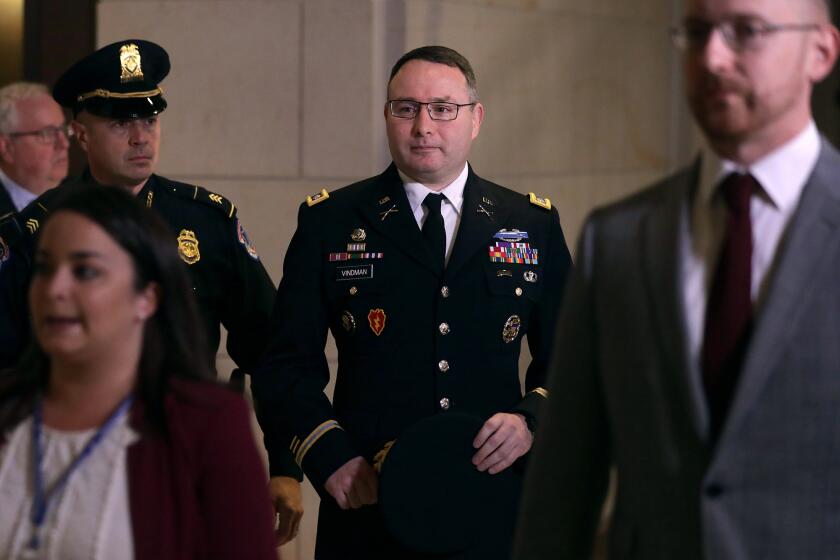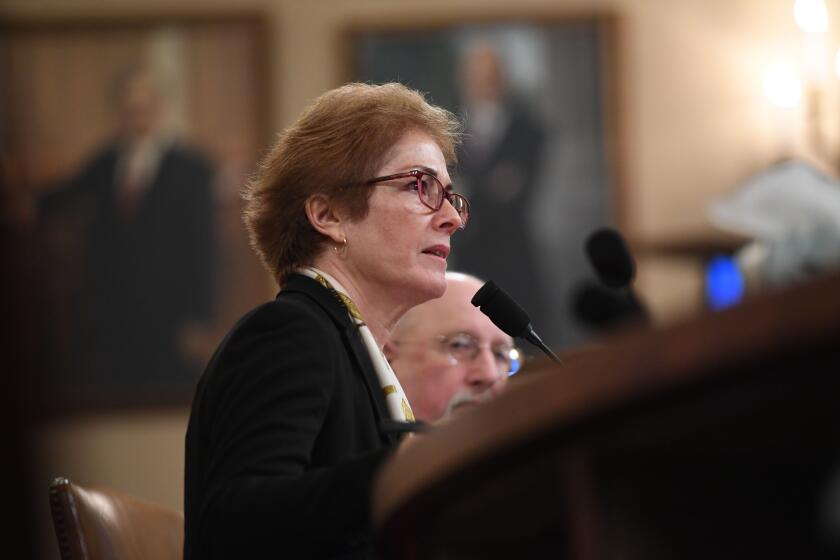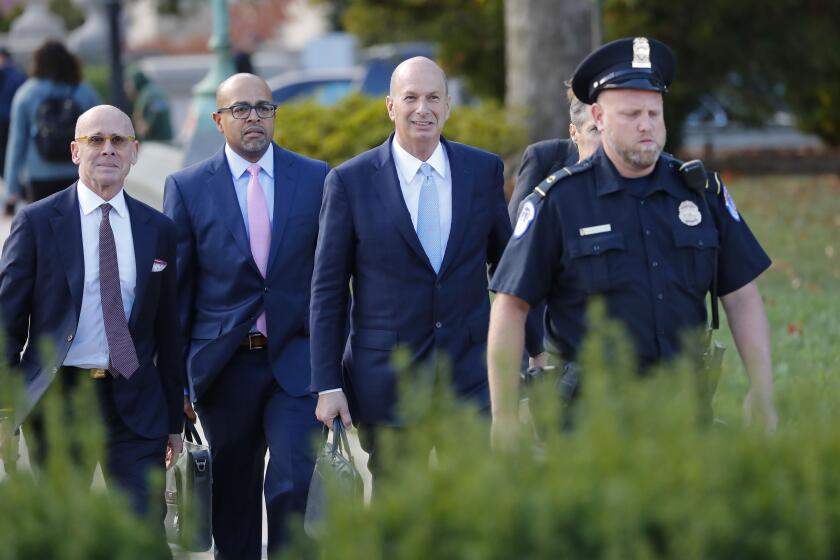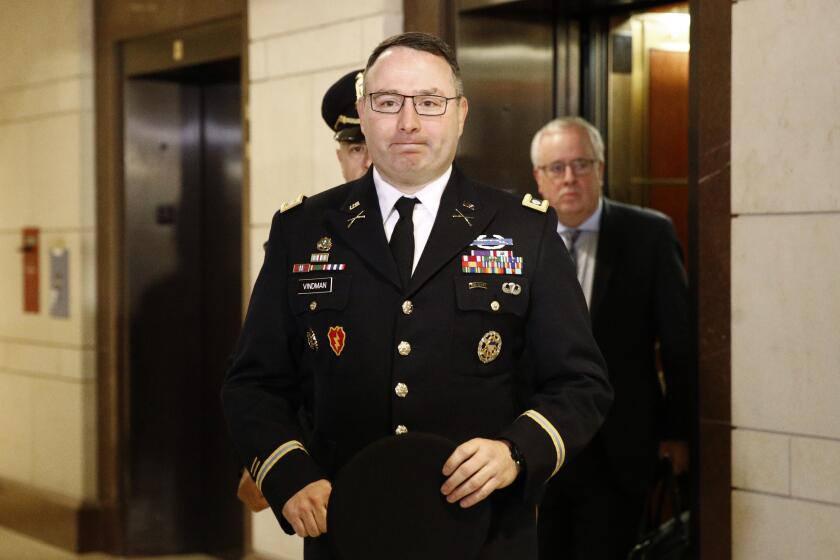Aides bring impeachment inquiry directly into the White House

- Share via
WASHINGTON — White House aides who listened in on President Trump’s controversial call with Ukraine’s president testified publicly for the first time Tuesday, bringing the impeachment inquiry directly into the White House and providing damaging new details about Trump’s efforts to press a foreign leader to investigate his political rivals while he held up crucial military aid.
The firsthand testimony countered days of complaints from Trump and his allies that previous testimony in the House Intelligence Committee was based on second- or third-hand accounts. Instead, the public heard from several officials or staffers who were on the call, or attended White House meetings, at the root of the inquiry.
The third day of hearings in the Democratic-led inquiry dragged on for more than 11 hours as lawmakers from both sides peppered four witnesses with questions. At least some evidence bolstered the Democrats’ case, and Republicans largely responded by trying to discredit the witnesses rather than dispute their testimony.
One key witness, who was summoned by Republicans, wound up shooting down conspiracy theories embraced by the president, saying pursuing them in Ukraine did not serve the “national interest.” He also called it inappropriate for Trump to ask a foreign leader to investigate a U.S. political rival.
One of the first two witnesses Tuesday, Lt. Col. Alexander Vindman, the top Ukraine expert on the National Security Council, said he was so alarmed by Trump’s “demand” on a July 25 call for Ukrainian President Volodymyr Zelensky to publicly investigate the Bidens that Vindman reported it “without hesitation” to a White House lawyer, calling it his “duty to report my concerns to the proper people in the chain of command.”
“It was inappropriate, it was improper for the president to demand an investigation into a political opponent, especially [from] a foreign power where there’s at best dubious belief that this would be a completely impartial investigation,” Vindman, a decorated Iraq war veteran, said during the hearing.
Although Trump didn’t use the word “demand,” Zelensky would have understood it that way “because of the power disparity between the two leaders,” said Vindman, who emigrated to the United States as a young child when his family fled the Soviet Union.
In response, Republican lawmakers intensified attacks on the media and sought to undermine the witness’ credibility. In several striking moments, they suggested Vindman was inflating his importance and questioned his integrity, even his decision to wear his Army dress uniform to the hearing. The 20-year Army veteran said he wore it because his patriotism had been questioned.
At Tuesday’s impeachment hearing, the GOP floated the nasty idea that witness Lt. Col. Alexander Vindman might have divided loyalties.
A Republican lawyer pressed Vindman to explain why a senior Ukrainian official had asked him several times to consider serving as the country’s defense minister, and asked if the official spoke in English or Ukrainian. Vindman said he dismissed the offer — made in English — as “funny,” and had immediately reported it to his superiors and U.S. counterintelligence officials, as required.
The harsh questioning followed conservative media attacks on Vindman’s loyalty to Trump and, implicitly, the country. Republican lawmakers also pressed him on whether he leaked to the press or would describe himself as a “never Trumper,” allegations he denied.
House Democrats are racing to complete their inquiry and decide whether to bring articles of impeachment against Trump over allegations that he hijacked U.S. policy toward Ukraine to boost his 2020 reelection bid by getting Zelensky to publicly commit to investigate former Vice President Joe Biden, a Democratic candidate.
Seven witnesses had testified by Tuesday night, and five more are scheduled before Congress leaves Thursday for the Thanksgiving recess.
Along with Vindman, the first serving White House official to give a deposition, and one of the first witnesses to provide direct, firsthand confirmation of numerous details in the anonymous whistleblower’s complaint that first fueled the inquiry, the committee also heard from Jennifer Williams, a State Department Ukraine expert assigned to Vice President Mike Pence’s office.
Williams said Trump’s request for specific investigations in his call with Zelensky struck her as “unusual and inappropriate” and “shed some light on possible other motivations” for Trump’s decision to freeze nearly $400 million in security aid to Ukraine in early July. She did not contact lawyers or her superiors.
Tim Morrison, who focuses on Europe and Russia policy at the National Security Council, and Kurt Volker, the former special representative to Ukraine, testified in the afternoon and evening.
Republicans had summoned them in hopes they would bolster their case that Trump did not block military assistance in a direct ploy to get Ukraine to help his reelection campaign. But both Morrison and Volker ultimately said they thought it inappropriate for Trump to ask a foreign leader to investigate a U.S. political rival.
President Trump is not alone in mistrusting the State Department: Presidents have often resented the advice offered by foreign service professionals.
Although Morrison said he found nothing improper with president’s phone call, he said he contacted White House lawyers because he worried how it would play in Washington’s charged political climate if the conversations leaked. In the end, the White House released a rough transcript of the call.
“My fears have been realized,” Morrison said.
Volker probably proved a bigger disappointment to Republicans. Following allegations that he misled lawmakers in his initial Oct. 3 deposition, Volker opened his testimony by revising his account in significant ways, saying he had “learned many things that I did not know at the time of the events in question.”
He said that he did not initially see a link between Trump’s demands for an investigation of Burisma, a Ukrainian natural gas company, and the fact that Biden’s son Hunter had served on its board. But he admitted that the Ukrainians would have reasonably conflated the two.
“In retrospect, I should have seen that connection differently, and had I done so, I would have raised my own objections,” he said.
He claimed he did not understand that Rudolph W. Giuliani, the president’s personal lawyer, was pushing Ukraine’s new leader to investigate the Bidens, and he publicly distanced himself from it. Indeed, Volker said he knew Biden for 24 years and praised him as an “honorable man and I hold him in the highest regard.”
Volker also shot down conspiracy theories embraced by Trump that Ukraine — rather than Russia — had meddled in the 2016 election.
And he dismissed Republican allegations that Biden had corruptly sought the ouster of a Ukrainian prosecutor to protect his son, saying such assertions were outlandish.
“These things I consider to be conspiracy theories that have been circulated by the Ukrainians, particularly the former prosecutor general. They’re not things that we should be pursuing as part of our national security strategy with Ukraine,” Volker testified.
“We should be supporting Ukraine’s democracy reforms, its own fight against corruption domestically, its struggle against Russia, its defense capabilities. These are the heart of what we should be doing and I don’t think pursuing these things serves a national interest.”
Volker also testified that he didn’t know about the significance that others — including then-national security advisor John Bolton — put on a July 10 meeting at the White House between senior administration officials and Ukrainians.
During that meeting, Gordon Sondland, the U.S. ambassador to the European Union, raised the prospect that U.S. military aid was linked to investigations, disturbing Bolton and others, Volker said.
Volker did not raise the meeting in his initial testimony. On Tuesday, he said “all of us thought it was inappropriate.”
Gordon Sondland could be the Democrats’ star witness but he has already changed his testimony, giving him a potentially serious credibility problem.
Sondland is scheduled to testify on Wednesday, and lawmakers from both parties consider it crucial since he had numerous conversations with Trump about Ukraine, including a cellphone call from a restaurant in Kyiv on July 26, the day after the call with Zelensky.
Earlier, Vindman and Williams both said they heard Trump mention Burisma on the July 25 call, citing their notes and recollection, although it does not appear in material released by the White House. Vindman said his attempt to add the word to the rough transcript was overruled, though he said he did not see the omission as a problem.
The White House was quick to dismiss the day’s developments as partisan posturing by Democrats looking for a reason to impeach Trump.
“We have learned nothing new in today’s illegitimate ‘impeachment’ proceedings,” White House spokeswoman Stephanie Grisham said in a statement. “However, buried among the witnesses’ personal opinions and conjecture about a call the White House long ago released to the public, both witnesses testified the July 25 transcript was ‘accurate’ and nothing President Trump has done or said amounts to ‘bribery’ or any other crime.”
Republicans repeated their request that the still-anonymous whistleblower testify.
Rep. Devin Nunes (R-Tulare), the highest ranking Republican on the committee, veered toward potentially identifying the whistleblower in his questioning of Vindman, prompting a heated exchange with Rep. Adam B. Schiff (D-Burbank), the committee chairman.
Vindman said he told two individuals about Trump’s conversation with Zelensky: George Kent of the State Department, whose portfolio included Ukraine, and “an individual in the intelligence community.” As Nunes pressed Vindman to identify the second individual, Schiff interjected.
“I want to make sure there is no effort to out the whistleblower in these proceedings,” Schiff said. “These proceedings will not be used to out the whistleblower.”
Rudolph Giuliani’s efforts to affect U.S. policy in Ukraine worried Lt. Col. Alexander S. Vindman and White House advisor Fiona Hill, according to transcripts.
When Nunes turned back to “Mr. Vindman,” the witness pointed out that he is a lieutenant colonel.
Nunes suggested Vindman was contradicting his deposition, in which he said he did not know the identity of the whistleblower. Republicans suspect Vindman was one of the sources used by the whistleblower.
Vindman then cited his legal counsel, saying he’d been advised not to answer questions about the intelligence community.
The Wall Street Journal reported Tuesday that the Army has offered to move Vindman and his family onto a military base if his safety is threatened as a result of his testimony.
Vindman noted that he could be killed in Russia for raising such concerns or speaking ill of the president, but he added, “This is America. This is the country I have served and defended. That all of my brothers have served. And here, ‘right’ matters.”
Times staff writer Noah Bierman contributed to this report.
More to Read
Get the L.A. Times Politics newsletter
Deeply reported insights into legislation, politics and policy from Sacramento, Washington and beyond. In your inbox twice per week.
You may occasionally receive promotional content from the Los Angeles Times.

















